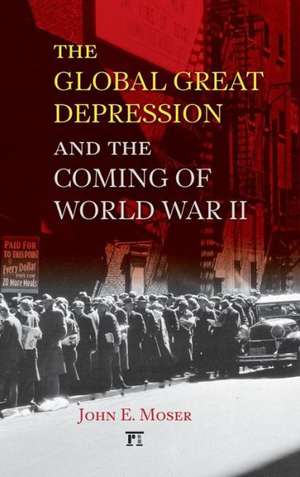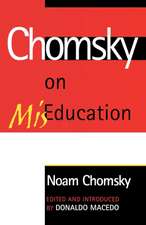Global Great Depression and the Coming of World War II: United States in the World
Autor John E. Moseren Limba Engleză Hardback – 30 ian 2015
| Toate formatele și edițiile | Preț | Express |
|---|---|---|
| Paperback (1) | 436.95 lei 6-8 săpt. | |
| Taylor & Francis – 30 iul 2015 | 436.95 lei 6-8 săpt. | |
| Hardback (1) | 1163.63 lei 6-8 săpt. | |
| Taylor & Francis – 30 ian 2015 | 1163.63 lei 6-8 săpt. |
Preț: 1163.63 lei
Preț vechi: 1419.06 lei
-18% Nou
Puncte Express: 1745
Preț estimativ în valută:
222.69€ • 231.63$ • 183.84£
222.69€ • 231.63$ • 183.84£
Carte tipărită la comandă
Livrare economică 12-26 aprilie
Preluare comenzi: 021 569.72.76
Specificații
ISBN-13: 9781594517495
ISBN-10: 1594517495
Pagini: 238
Ilustrații: black & white illustrations
Dimensiuni: 152 x 229 x 18 mm
Greutate: 0.45 kg
Ediția:1
Editura: Taylor & Francis
Colecția Routledge
Seria United States in the World
Locul publicării:Oxford, United Kingdom
ISBN-10: 1594517495
Pagini: 238
Ilustrații: black & white illustrations
Dimensiuni: 152 x 229 x 18 mm
Greutate: 0.45 kg
Ediția:1
Editura: Taylor & Francis
Colecția Routledge
Seria United States in the World
Locul publicării:Oxford, United Kingdom
Cuprins
1 A Return to Normalcy? The United States, 1920-1928
2 The Victors Diverge: The "Haves," 1920-1928
3 Liberalism and Its Discontents: The "Have-Nots," 1920-1928
4 The Crisis Begins: The United States, 1928-1933
5 A Tale of Two Countries: The "Haves," 1928-1933
6 Dancing on a Volcano: The "Have-Nots," 1928-1933
7 Beggar Thy Neighbor: The United States, 1933-1936
8 The Unraveling of the Western Alliance: The "Haves," 1933-1936
9 Recovery through Nationalism: The "Have-Nots," 1933-1936
10 Stumbling toward Internationalism: The United States,1936-1939
11 The Economics of Appeasement: The "Haves," 1936-1939
12 Taking the Plunge: The "Have-Nots," 1936-1939
13 War for Plunder, 1939-1941
2 The Victors Diverge: The "Haves," 1920-1928
3 Liberalism and Its Discontents: The "Have-Nots," 1920-1928
4 The Crisis Begins: The United States, 1928-1933
5 A Tale of Two Countries: The "Haves," 1928-1933
6 Dancing on a Volcano: The "Have-Nots," 1928-1933
7 Beggar Thy Neighbor: The United States, 1933-1936
8 The Unraveling of the Western Alliance: The "Haves," 1933-1936
9 Recovery through Nationalism: The "Have-Nots," 1933-1936
10 Stumbling toward Internationalism: The United States,1936-1939
11 The Economics of Appeasement: The "Haves," 1936-1939
12 Taking the Plunge: The "Have-Nots," 1936-1939
13 War for Plunder, 1939-1941
Recenzii
“With this bold and far-reaching interpretation of the economic interplay and its political consequences among the world’s great powers during the first half of the twentieth century, John Moser takes his place alongside such eminences as Charles Kindleberger and Barry Eichengreen. He has given us a landmark work in international history.”
—Alonzo L. Hamby, Distinguished Professor of History, Ohio University, and author of For the Survival of Democracy: Franklin Roosevelt and the World Crisis of the 1930s
“The thesis of this book is that the ‘global great depression’ between the wars turned several major powers decisively against liberal capitalism as well as socialism and toward imperialistic ‘third way’ policies, which led to the breakdown of international order and the onset of the Second World War. This is a provocative claim and one that is likely to attract wide interest in view of the continuing fascination with the Second World War and the relative paucity of book-length studies that focus upon economic origins. The author’s clear, concise, non-technical English makes this potentially rebarbative topic accessible to a broad range of potential readers and his wide-ranging study displays maturity and balance.”
—Robert Boyce, London School of Economics and author of The Great Interwar Crisis and the Collapse of Globalization
—Alonzo L. Hamby, Distinguished Professor of History, Ohio University, and author of For the Survival of Democracy: Franklin Roosevelt and the World Crisis of the 1930s
“The thesis of this book is that the ‘global great depression’ between the wars turned several major powers decisively against liberal capitalism as well as socialism and toward imperialistic ‘third way’ policies, which led to the breakdown of international order and the onset of the Second World War. This is a provocative claim and one that is likely to attract wide interest in view of the continuing fascination with the Second World War and the relative paucity of book-length studies that focus upon economic origins. The author’s clear, concise, non-technical English makes this potentially rebarbative topic accessible to a broad range of potential readers and his wide-ranging study displays maturity and balance.”
—Robert Boyce, London School of Economics and author of The Great Interwar Crisis and the Collapse of Globalization
Descriere
This book demonstrates the ways in which the economic crisis of the late 1920s and early 1930s helped to cause and shape World War II. John Moser points to the essential uniformity in the way in which the world's industrialized and industrializing nations responded to the challenge of the Depression. They had much in common, but there was still a great divide between two different general approaches to the economic crisis. This interplay of powers constituted the international dynamic of the 1930s: "have-nots" attempting to achieve self-sufficiency through aggressive means, challenging "haves" that mistrusted one another and failed to work cooperatively in an effort to stop them.













